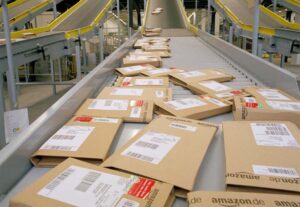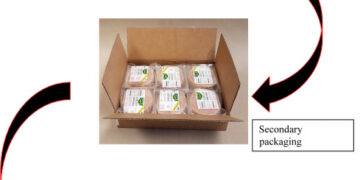The rise of e-commerce has had a significant impact on the packaging industry. With more and more consumers opting to shop online, packaging has become an essential component of the e-commerce experience. This article will explore the impact of e-commerce on packaging, including the challenges it presents and the opportunities it creates.
Introduction to E-commerce and Packaging
E-commerce has revolutionized the way we shop. With the click of a button, we can purchase products from all over the world and have them delivered to our doorstep. This convenience has made online shopping increasingly popular, leading to a surge in demand for packaging.
Packaging plays a critical role in e-commerce. It protects the product during transportation, keeps it secure during storage, and helps create a positive customer experience. In this article, we will examine the impact of e-commerce on packaging and how the packaging industry is responding to the challenges it presents.

Challenges Presented by E-commerce Packaging
E-commerce packaging presents several challenges that traditional retail packaging does not. These include:
- Shipping and handling: Unlike traditional retail packaging, e-commerce packaging must withstand the rigors of transportation. Packages may be tossed, dropped, or stacked, so they need to be durable and secure to prevent damage to the product.
- Customization: E-commerce packaging must be designed to accommodate a wide range of product sizes and shapes. Unlike retail packaging, which can be standardized for a particular product, e-commerce packaging needs to be customizable to fit the product being shipped.
- Sustainability: With the increase in online shopping, there has been a corresponding increase in packaging waste. E-commerce packaging must be sustainable and environmentally friendly to reduce its impact on the environment.
Opportunities Created by E-commerce Packaging
While e-commerce packaging presents challenges, it also creates opportunities for innovation and creativity. Here are some of the opportunities created by e-commerce packaging:
- Branding: E-commerce packaging provides an opportunity for companies to showcase their brand and create a positive customer experience. Customized packaging can help companies stand out from their competitors and build brand loyalty.
- Personalization: E-commerce packaging can be customized to include personalized messages, coupons, or promotional materials. This can help companies create a more personal connection with their customers and increase customer engagement.
- Sustainability: E-commerce packaging provides an opportunity for companies to improve their sustainability credentials. By using sustainable materials and reducing waste, companies can reduce their environmental impact and appeal to eco-conscious customers.
Trends in E-commerce Packaging
The e-commerce packaging industry is constantly evolving to meet the demands of consumers and businesses. Here are some of the current trends in e-commerce packaging:
- Minimalism: Many companies are opting for minimalistic packaging that is eco-friendly and visually appealing. This type of packaging uses minimal materials and is designed to be recycled or reused.
- Customization: As mentioned earlier, customization is becoming increasingly important in e-commerce packaging. Companies are designing packaging that can be easily customized to fit a variety of product sizes and shapes.
- Sustainable materials: Sustainable packaging is a growing trend in e-commerce. Companies are using biodegradable, compostable, or recycled materials to reduce their environmental impact.
- Smart packaging: Smart packaging is an emerging trend in e-commerce. This type of packaging includes features such as QR codes, NFC tags, or augmented reality to enhance the customer experience and provide additional product information.
The Importance of Sustainable E-commerce Packaging
Sustainability has become a key concern for consumers, businesses, and governments alike. The e-commerce industry is no exception, with many companies looking for ways to reduce their environmental impact. Sustainable packaging plays a critical role in this effort.

Sustainable e-commerce packaging is designed to be environmentally friendly and reduce waste. It can be made from a variety of materials, including recycled paper, biodegradable plastics, or compostable materials. Sustainable packaging also focuses on reducing the amount of material used, which can help to reduce shipping costs and minimize the carbon footprint of e-commerce.
The benefits of sustainable e-commerce packaging are numerous. It can help companies reduce their environmental impact, appeal to eco-conscious consumers, and reduce shipping costs. Sustainable packaging can also help to create a positive customer experience by showcasing a company’s commitment to sustainability.
Challenges in Implementing Sustainable E-commerce Packaging
While sustainable e-commerce packaging is desirable, there are several challenges in implementing it. These include:
- Cost: Sustainable packaging can be more expensive than traditional packaging materials. This can be a significant barrier for smaller businesses or those operating on a tight budget.
- Availability: Sustainable packaging materials may not be readily available, making it difficult for companies to switch to more environmentally friendly options.
- Compatibility: Sustainable packaging materials may not be compatible with existing packaging equipment or supply chains, which can make it difficult to implement sustainable packaging solutions.
Despite these challenges, there are many opportunities for companies to implement sustainable e-commerce packaging solutions. By working with suppliers, innovating packaging designs, and focusing on reducing waste, companies can make progress towards more sustainable e-commerce packaging.
Future of E-commerce Packaging
The future of e-commerce packaging is bright, with many opportunities for innovation and sustainability. Some of the trends that are likely to shape the future of e-commerce packaging include:
- Biodegradable and compostable materials: These materials will become more widely available and affordable, making it easier for companies to switch to sustainable e-commerce packaging.
- Automation: Advances in automation technology will enable companies to streamline their packaging processes, reduce waste, and improve efficiency.
- Smart packaging: Smart packaging will become more common, providing customers with additional product information and enhancing the customer experience.
- Circular economy: The circular economy will become a more prominent concept in the e-commerce industry. This approach focuses on reducing waste by designing products and packaging materials that can be recycled, reused, or repurposed
Conclusion
E-commerce has had a significant impact on the packaging industry, presenting both challenges and opportunities. Sustainable e-commerce packaging is becoming increasingly important as companies seek to reduce their environmental impact and appeal to eco-conscious consumers.
While there are challenges in implementing sustainable e-commerce packaging solutions, there are also many opportunities for innovation and creativity. As the e-commerce industry continues to grow, the packaging industry will need to adapt to meet the changing needs of consumers and businesses.















